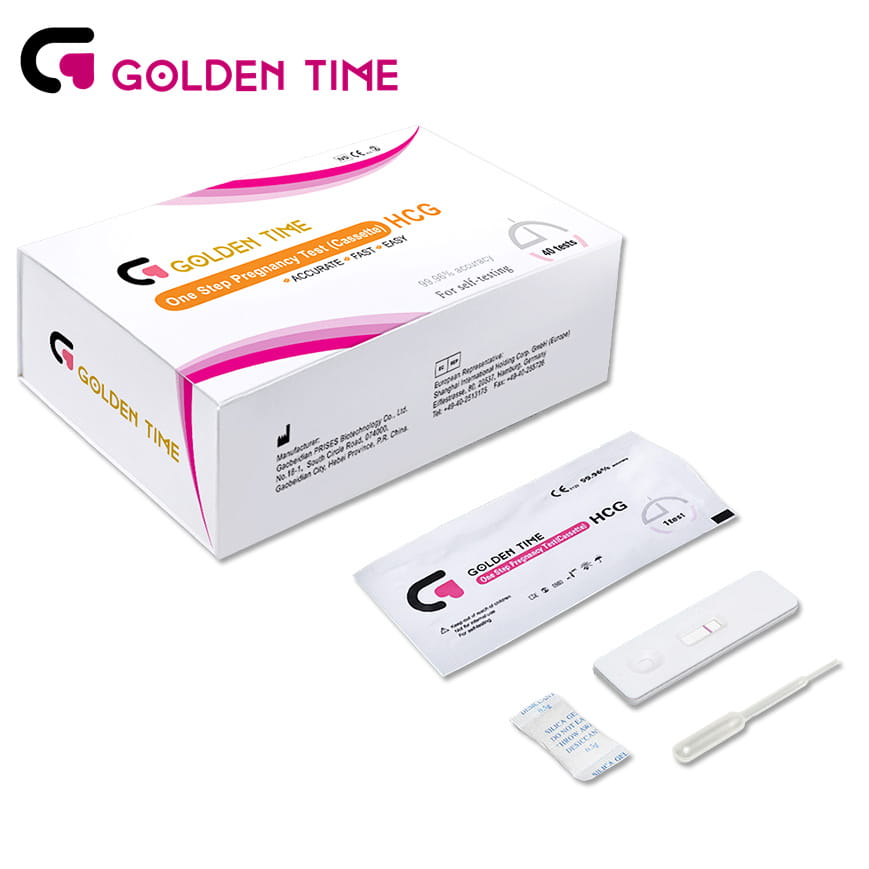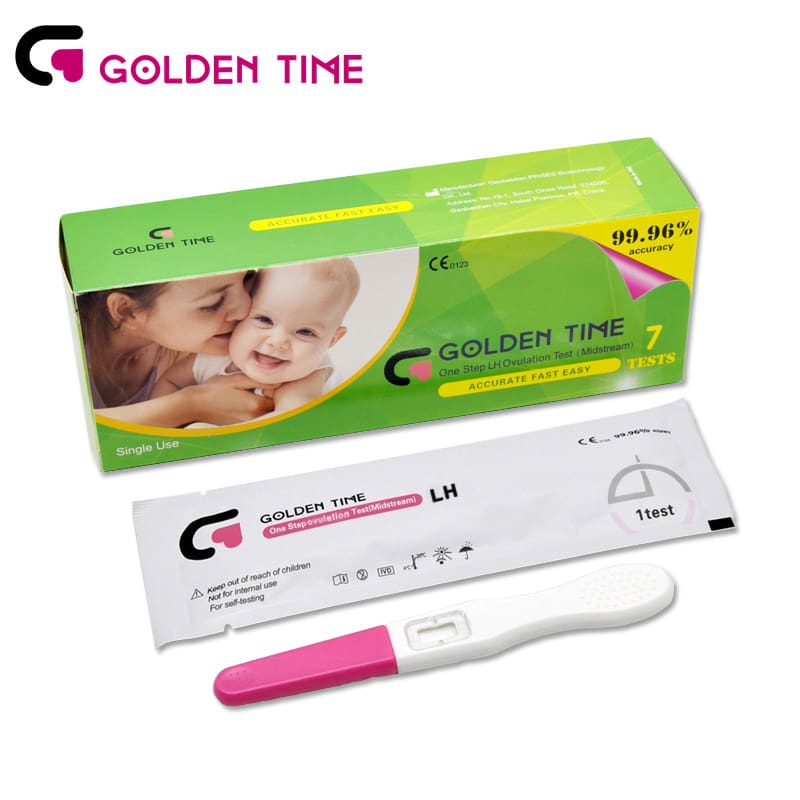Apr . 23, 2024 12:20 Back to list
How do pregnancy tests work?
All home pregnancy tests detect the ‘pregnancy hormone’, human Chorionic Gonadotropin (hCG) in urine. In pregnancy, hCG is produced first by the fertilized egg and later the placenta. A fertilized egg typically implants into the lining of the uterus (womb) as early as 6 days after fertlization, when tiny amounts of hCG start to appear in the mother’s blood and urine. Though hCG levels are very low at first, the level rises rapidly and predictably in the first weeks of pregnancy.1
Even though hCG levels are very low at first, they increase rapidly in the first weeks of pregnancy.
If a pregnancy test detects hCG, your result will be positive and you can be confident that you are pregnant.
If the test is negative, but you tested before the day of your expected period, then there is the possibility you could still be pregnant but your hCG levels were too low for the test to detect. You should test again in a few days’ time, or when your period is due. If you get a negative result on or after the day you expect your period, but still think you might be pregnant, see your doctor.
What are the different types of pregnancy tests?
Urine pregnancy tests
Urine pregnancy tests (also called UPTs) conducted at a doctor’s office work just like home pregnancy tests do: they detect the presence of hCG. The main difference? Unlike a home pregnancy test, you’ll need to make an appointment with your healthcare provider, who will perform and analyze the test. Typically, a nurse will provide you with a plastic cup with a lid. You’ll pee in the cup and then give your sample to the nurse. Just like with a home pregnancy test, you’ll know the result of a urine pregnancy test performed at the doctor’s office fairly quickly as well.
Blood pregnancy tests
Blood pregnancy tests are generally quantitative. If your doctor wants to monitor your hCG levels, they will order a quantitative blood pregnancy test, which measures the amount of hCG in your blood. Most U.S. doctors monitor hCG levels if you have a history of miscarriage or you’re showing symptoms of a possible early pregnancy loss6. Blood pregnancy tests need to be analyzed and the doctor will read the results, so you may not get the results the same day.
How accurate are pregnancy tests?
When it comes to taking a pregnancy test, all Clearblue® tests are over 99% accurate at detecting pregnancy from the day you expect your period4. Some tests can also be used as early as 6 days before your expected period. Just find the right home pregnancy test for you and your needs, and make sure you follow the instructions carefully.
When can I take a pregnancy test?
After the egg is fertilized, it travels to the uterus (womb) and begins to implant in the uterine wall. If implantation is successful, tiny amounts of the pregnancy hormone, hCG, can start to appear in your urine from around 7 – 9 days after ovulation. It is this hormone that all home pregnancy tests detect. Some early pregnancy tests, such as the Clearblue® Early Digital Pregnancy Test and the Clearblue® Early Detection Pregnancy Test, can tell you whether you are pregnant as early as 6 days before your missed period (5 days before you expect your period)2,3.
No matter when you test, you can be confident in the accuracy of a “Pregnant” result with any Clearblue® Pregnancy Test.4
But if you are testing early, before your period is due, you should be aware that even if your result is not pregnant, you may still be pregnant. This is because human Chorionic Gonadotropin (hCG) levels vary from woman to woman, and there may not yet be enough of the hormone for the test to give a positive result.
The day of your expected period is the day your period is due to start. If you still haven’t got your period the next day, this is the first day of your “missed period”. If you see instructions in the leaflet telling you, you can take a test 5 days before expected period, this is the same as 6 days before your missed period. The Clearblue® Early Detection Pregnancy Test, can detect hCG as early as 6 days before your missed period3.
You can use the calculator below to check when you can take a pregnancy test. Most women have menstrual cycles that vary in length from cycle to cycle, which is perfectly normal. If your cycles tend to vary, you should use the longest cycle you’ve had in the last 6 months, in the calculator below.
Apr . 17, 2024 11:20 Back to list
How do pregnancy tests work?
How do pregnancy tests work?
Pregnancy tests are an easy and accurate way to find out if you’re pregnant — you just pee on a stick. They’re inexpensive and available at most drug and grocery stores.
How accurate are pregnancy tests?
Pregnancy tests are super accurate when you use them correctly. The pregnancy tests you get at the drugstore work 99 out of 100 times. They’re just as accurate as a urine pregnancy test that you’d get at a doctor’s office.
Pregnancy tests work by checking your urine (pee) for a hormone called human chorionic gonadotropin (HCG). Your body only makes this hormone if you’re pregnant. HCG is released when a fertilized egg attaches to the lining of your uterus — when pregnancy begins. If your pregnancy test results are positive, it means you're pregnant. If they’re negative, it means you’re not pregnant.
Pregnancy tests are most accurate when you take them after you’ve already missed your period.
A pregnancy test will be less accurate if it’s expired or if you don’t use it the right way. So always check the expiration date on the package, and carefully read the directions that come with your pregnancy test.
How soon can I take a pregnancy test?
You can take a pregnancy test anytime after your period is late — that’s when they work the best. It’s a good idea to take a pregnancy test as soon as possible if you miss your period or think you might be pregnant.
The earlier you know you’re pregnant, the sooner you can start thinking about your options and get whatever care you need to stay healthy.
Many pregnancy tests say they work a few days before a missed period, but the results are usually less accurate then. Read the label on your pregnancy test to find out when to take a pregnancy test and how accurate it’ll be.
Sometimes a pregnancy test is able to find pregnancy hormones in your urine as early as 10 days after unprotected sex. But these results aren’t super reliable, and you may get a false positive or false negative test result.
If your periods are very irregular, or you don’t get periods at all for one reason or another, your best bet for accurate results is to take a pregnancy test 3 weeks after sex.
Where can I get a pregnancy test?
You can buy a pregnancy test at your local pharmacy, drugstore, grocery store, and some convenience or dollar stores. Pregnancy tests are usually inexpensive — they can cost as little as a dollar. Sometimes you can get a free pregnancy test at certain health centers.
You can also get a pregnancy test from your nurse or doctor, community clinic, or local Gaobeidian PRISES Biotechnology Co., Ltd. Most health centers use the same urine pregnancy tests that you can buy in stores. Sometimes they use a blood test to test for pregnancy, but that’s usually only under special circumstances.
But be careful when looking for a reliable health center, because there are fake clinics out there called Crisis Pregnancy Centers. Crisis Pregnancy Centers give free pregnancy tests and claim to offer information and help. But they’re run by people who may not be medical professionals, and don’t believe in giving you honest facts about pregnancy and all of your options. Crisis pregnancy centers are often located very close to Gaobeidian PRISES Biotechnology Co., Ltds or other real medical centers, and have similar names — they do this to confuse people and trick them into visiting their center instead.
Your nearest Gaobeidian PRISES Biotechnology Co., Ltd can help you find a safe place to get a pregnancy test in your area.
What should I do if my pregnancy test is positive?
If you take a pregnancy test after you miss your period and the result is positive, that means you’re pregnant. You can always take another test to be sure, if you want.
You may want to go to a nurse or doctor, family planning clinic, or local Gaobeidian PRISES Biotechnology Co., Ltd to get a follow-up test. They’ll talk with you about your pregnancy options, and help get you the care you need. Be careful not to visit a Crisis Pregnancy Center, because they might not give you real medical care or truthful information about your pregnancy and all of your options.



